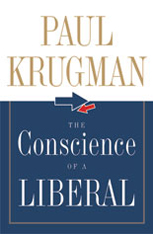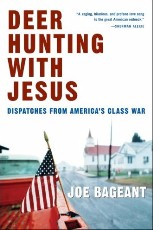The Conscience of a Liberal
by Paul Krugman
Norton
Deer Hunting with Jesus: Dispatches from America’s Class War
by Joe Bageant
Crown
 “One of the seeming paradoxes of America in the early twenty-first century is that those of us who call ourselves liberal are, in an important sense, conservative, while those who call themselves conservative are for the most part deeply radical. Liberals want to restore the middle-class society I grew up in; those who call themselves conservative want to take us back to the Gilded Age, undoing a century of history.”
“One of the seeming paradoxes of America in the early twenty-first century is that those of us who call ourselves liberal are, in an important sense, conservative, while those who call themselves conservative are for the most part deeply radical. Liberals want to restore the middle-class society I grew up in; those who call themselves conservative want to take us back to the Gilded Age, undoing a century of history.”
--Paul Krugman, The Conscience of a Liberal
Paul Krugman and I are about the same age, born in the early ‘50s smack dab in the middle of the baby boom. Like him, I took the middle class American life pretty much for granted, assuming things for my generation and our offspring would continue to get better as the nation became an ever more just and caring society.
There were a few wealthy men in town when I was growing up, but even the richest individuals I was aware of sent their children to public schools, sat in church just a few rows away from my family, and lived in a neighborhood near some of my best friends. In fact, some of my best friends were the children of those well-to-do folks.
Krugman, who grew up to become an award-winning economist and New York Times columnist, had a similar childhood experience. But like me, he has become increasingly troubled and alarmed by the shrinking of the middle class and the growing inequality between the haves and the have-nots over the last thirty years. In his new book, The Conscience of a Liberal, he tells what happened, how it happened and proposes an agenda to literally take back America from the movement conservatives who have despoiled the national economic, environmental and social landscape. It is must reading for every thinking citizen.
Krugman sets up the story of how we got to where we are today with a fairly concise history of the last century, one that dawned in the midst of a “Gilded Age” of robber barons, business tycoons and vast inequality. He explains how Franklin Roosevelt’s political decisions and New Deal policies not only lifted the country out of the Great Depression, but also resulted in a “Great Compression” and the post-World War II economic boom of the ‘50s and ‘60s, whose benefits were shared by many.
In those days, the right-wing lunatic fringe was actually relegated to the periphery of political conversation. Television and radio evangelists, self-proclaimed racists and rabid conservatives in organizations like the John Birch Society were considered kooks whose ideas were not taken seriously in the mainstream where actual policy debates took place. Republicans and Democrats had their differences, sure, but there was general agreement about the importance of a progressive tax system that limited excessive wealth at the top of the income ladder, and Social Security, unemployment insurance and later Medicare were considered sacrosanct.
A funny thing happened, though, as the Republican Party sought a way to establish some sort of electoral base for itself after the Goldwater debacle of 1964. Four years later, the Nixon campaign seized upon the concept of a “southern strategy,” using coded appeals to racial intolerance, to lure a new component of formerly Democratic lower-income whites into a coalition with wealthy business leaders and turn-back-the-clock social conservatives. The 1968 and ’72 presidential elections heralded an era in which working people would vote against their own economic self-interests in favor of appeals to their racial or religious prejudices.
 In his provocatively entitled book, Deer Hunting with Jesus, writer Joe Bageant tells the story of moving back to his hometown of Winchester, Virginia, in 1999, thirty years after leaving to pursue a career as journalist and editor. What he found when he returned was “the America that carried George W. Bush to victory,” an “unacknowledged parallel world to that of educated urban liberals.”
In his provocatively entitled book, Deer Hunting with Jesus, writer Joe Bageant tells the story of moving back to his hometown of Winchester, Virginia, in 1999, thirty years after leaving to pursue a career as journalist and editor. What he found when he returned was “the America that carried George W. Bush to victory,” an “unacknowledged parallel world to that of educated urban liberals.”
Here is the world of NASCAR, fundamentalist Christianity, karaoke, gun ownership, and employment as Wal-Mart cashiers and Rubbermaid forklift drivers for hourly pay at or barely above minimum wage. It’s an absorbing, hilarious, heartfelt and very human homage to a place and its people, and a rage against the machinery of class warfare that has kept the book’s subjects economically depressed and educationally repressed. It’s also an eye-opening exposé of the ways in which these folks have allowed themselves to be co-opted by a Republican Party hell bent on using and abusing them.
Bageant hammers away at the dumbing down of the masses by television and the consumer culture: “So long as Pootie, Nance, Dottie and even [millionaire realtor] Bobby Fulk remain incapable of reading or grasping what the greatest minds have learned and written, or can’t tell the difference between a patriotic country song and political truth, we aren’t likely to make much human progress, no matter how good the economy is or how much stuff we own.”
Deer Hunting with Jesus is riveting and frightening, leaving the reader with a feeling of helplessness and hopelessness. Is this as good as America is going to become now? Are things that far gone?
Paul Krugman argues otherwise. He sees an opportunity to grab the moment with progressive policies and forward thinking leadership. He proposes universal health care as the lynchpin of a “new New Deal” that will reinvigorate the Democratic Party and the nation. He calls for a revitalized union movement and a restoration of progressivity to the tax system.
“I believe in a relatively equal society,” he writes, “supported by institutions that limit extremes of wealth and poverty. I believe in democracy, civil liberties, and the rule of law. That makes me a liberal and I’m proud of it.”
The Conscience of a Liberal is a clarion call to “make America a middle-class nation again.”
copyright © 2007 Jim Newsom. All Rights Reserved.

